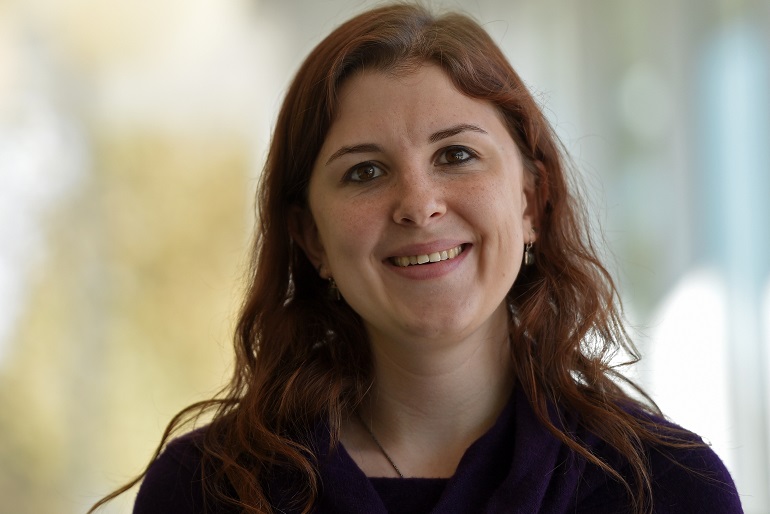
The National Institute on Drug Abuse has awarded Wayne State University School of Medicine student Tabitha Moses its Ruth L. Kirschstein National Research Service Award for Individual M.D./Ph.D. Fellows, her first training grant from the National Institutes of Health since entering the medical school in 2016.
Moses is an M.D.-Ph.D. student now in the third year of her doctoral program in the Department of Psychiatry and Behavioral Neurosciences.
The award combines medical school and predoctoral support until 2025, including $44,478 in the first year, for annual stipend, funds for tuition/fees, research supplies, equipment, travel and related items.
Moses studies how stress and changes in brain function are associated with substance use and relapse in people with opioid use disorder, or OUD, specifically, the executive function pathway and the reward/emotional response pathway. These neural pathways might be impaired in people with OUD.
“When these pathways don't work in the way they should, it can make it much harder for someone to stop using drugs when they want to stop. In people with OUD who want to stop using drugs, there are a lot of things that make it very difficult to stop and increase the likelihood of relapse,” Moses said. “Stress is one of those things. Stress is associated with increased substance use and relapse. Furthermore, stress can impair function in those same pathways that are already impacted in people with OUD, which makes it even harder to quit.”

Her dissertation advisor is the department’s Associate Chair for Research and Professor Mark Greenwald, Ph.D.
“Tabitha has an amazingly keen and persistent intellect, possesses broad-ranging scientific acumen and skills, and exercises first-rate management abilities and excellent judgment,” he said. “Since 2016, Tabitha has taken initiative in organizing, analyzing, interpreting and publishing data from our programmatic studies with chronic heroin users. She is totally plugged into the scope and significance of the ongoing opioid epidemic, and is determined to spend her time and talents wisely to address this unprecedented public health problem.”
The start of her dissertation research was delayed more than year due to the COVID-19 pandemic. She hopes to return to research next month and start recruiting for her dissertation project. Her new goal is to defend her dissertation and graduate in 2025.
“I feel very grateful and happy to receive this grant. Despite the fact that my research has been halted for a year, I was able to use that time productively, including writing this grant, so it feels good that my hard work and the efforts and mentoring of those around me has been rewarded,” she said.
Moses will use a form of non-invasive neuromodulation called repetitive transcranial magnetic stimulation, or rTMS, to alter activity in neural pathways that are impaired in people with OUD and impacted by stress in an attempt to decrease the negative effects of stress and make it easier for them to reduce their substance use and stay in treatment.
“Although OUD is the substance use disorder with some of the most treatments available, currently less than 20% of people with OUD are in treatment, and of those who are in treatment less than 50% remain in treatment after six months,” she said.
The reasons include problems with the treatment systems and policies and abstinent-focused goals; however, one reason the fact that current treatments are unable to address some of the other major causes of relapse, such as stress.
“With this study, I hope to gain a better understanding of some of the problems that people with OUD face when trying to seek treatment and develop a theory-driven intervention that can be given in addition to currently-approved treatment to help people meet their treatment goals,” Moses said. “I believe that we have a lot of work to do in research, medical education and policy with regard to our treatment of, and approaches to, people with SUDs. Through my work and research in SUDs, I not only want to improve treatment options, I also hope to play a role in improving our understanding of the needs of patients with SUDs and improving attitudes of health care workers toward patients with SUDs.”
Moses is grateful to the faculty members who have provided “countless hours of mentoring and guidance,” she said. “My primary dissertation advisor, Dr. Mark Greenwald, and also my committee members, Dr. Leslie Lundahl, Dr. Christine Rabinak, Dr. Nicholas Mischel and Dr. Emily Grekin. Additionally, the other students in the Translational Neuroscience Program, who always provide guidance, and advice and have helped to create a wonderfully supportive environment. Without their help and support, I would not have received this grant.”
Dr. Greenwald called Moses an exceptionally meritorious applicant for the training award. “Her extensive scientific background, successful early-stage medical and graduate training, scholarly productivity and her rigorous past-year experiences in researching and conceptualizing this project offer clear evidence of her exemplary qualifications and preparedness to undertake this research training and for a research career as a physician-scientist,” he said. “Tabitha’s incredible drive – always in the service of helping others – organizational capacity and impressive writing ability, both quantity and quality, already exceed the skills of most postdoctoral fellows. Without doubt, Tabitha is an elite early-career scholar in drug abuse research who exhibits outstanding promise as a physician-neuroscientist.”
The Translational Neuroscience program at WSU is directed by Professor Jeffrey Stanley, Ph.D. He noted Moses’s academic prowess, as well as her swift pivot to help the Detroit community when the COVID-19 pandemic hit Michigan in 2020. Moses was among the medical students who coordinated child care and home management for COVID-19 frontline residents and attending physicians who found themselves working tirelessly for extremely sick patients. She has been an active member of School of Medicine’s Detroit vs Addiction and American Medical Association student organizations, serving both in leadership roles.
“Tabitha has demonstrated significant growth and maturity in her training and becoming a talented young physician-scientist with a bright future. She is extremely active in the WSU community in promoting medical training, especially in dealing with the COVID-19 pandemic,” Dr. Stanley said.
Moses reviewed academic literature to identify major gaps, and to conceptualize and implement an independent program of research. She decided to focus on neuromodulation as an experimental tool to understand stress-induced dysregulation in frontal-cortical-mediated executive functions and as a potential therapeutic modality for attenuating stress-potentiated drug seeking.
Dr. Greenwald directs the Substance Abuse Research Division, its Human Pharmacology Laboratory and the outpatient treatment research clinic in the Department of Psychiatry and Behavioral Neurosciences at Wayne State University.
“Although I had contemplated moving our lab in this direction, I credit Tabitha for taking the initiative to formulate and launch this initiative,” he said.